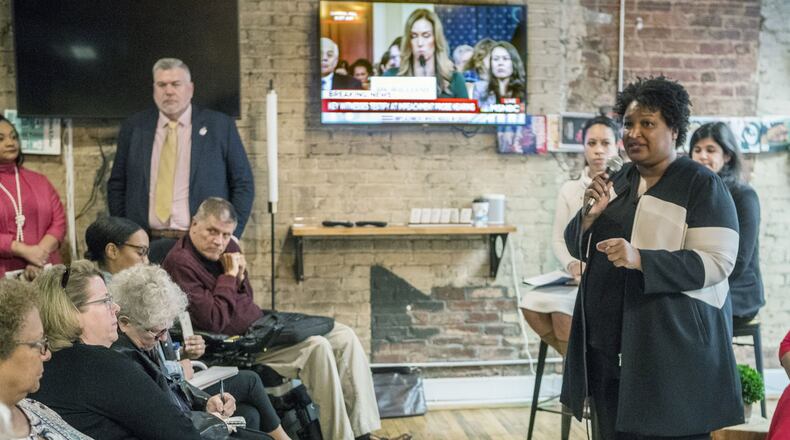About halfway through a rapid-fire round of questions, U.S. Sen. Amy Klobuchar was asked how she’s preparing for Wednesday’s debate.
“This is it,” she said with a grin, motioning to the ring of journalists surrounding her at an Atlanta museum, before allowing that she’ll huddle, too, with aides and advisers before the big showdown.
The White House hopefuls who descended on Atlanta this week kept a torrid pace of fundraisers, events and private meetings with advisers ahead of the debate at Tyler Perry Studios.
For some candidates, the Wednesday event is another chance to slice and dice at opponents with ready-made zingers and crisp policy proposals. For others, it could be a last gasp on the debate stage before qualifying standards tighten.
Related: From protests to watch parties: Debate events happening in Atlanta
Related: The major issues in Georgia
Related: Where to find the White House hopefuls in Georgia this week
Local Democrats are trying to seize the moment, too, presenting Georgia as a battleground state worthy of a torrent of new investment. State Sen. Nikema Williams, the chairwoman of the Democratic Party of Georgia, carried that message to a whirl of events.
“It shows that we are being recognized by the national party as a battleground state, a true battleground state,” she said. “And that’s exactly what we’ve been saying all along, is that the path to the White House is paved right here through Georgia.”
Stacey Abrams, the 2018 Democratic nominee for governor, attracted as much media attention as any presidential candidate, with rows of TV cameras set up well in advance of her brief speech at a prim downtown Atlanta lobbying office.
And Atlanta Mayor Keisha Lance Bottoms stressed the magnitude of the moment, too, as she sat in her ceremonial office in City Hall and spoke about the symbolism of Wednesday’s debate, which is being held at a $250 million studio complex built on the site of Fort McPherson, a former military installation.
“For Atlanta, it is especially special because of where it is,” Bottoms said of the venue. “This used to be a Confederate stronghold. And now to have a Democratic debate hosted in southwest Atlanta — it speaks to the world about who we are as a city.”
‘Too many people’
That wasn’t lost on the handful of Democratic hopefuls who had arrived early in Atlanta, with most stressing voting rights or rolling out initiatives aimed at African American voters ahead of the debate.
Entrepreneur Andrew Yang polished up his ballot access agenda, which includes a pledge to lower the voting age for federal elections by two years to 16. Pete Buttigieg, the mayor of South Bend, Ind., held court at fundraisers in downtown Atlanta packed with well-heeled donors.
AJC Poll: Georgia voters on the candidates and issues
Related: Voting struggles put spotlight on major elections in Georgia
Related: Georgia anti-abortion law could drive discussion at Democratic debate
And Tom Steyer, the billionaire activist, met with black clergy leaders at an Atlanta hotel. Among them was Jerry Hutchins, a senior pastor at a Snellville church who came more out of curiosity.
“There are too many people talking,” he said. “I want a smaller group, then we can hear the message and focus on what a few are saying.”
A big crowd flocked to Abrams, too, who opened her remarks with a joke she repeats at most events, a reminder to her audiences of last year’s drawn-out post-election battle over ballots: “My name is Stacey Abrams and I am not the governor of Georgia.”
“If you’ve got to prove every single time there’s an election that you have the right to be heard, eventually they’re just going to fall silent out of exhaustion,” said Abrams, who has ruled out a presidential bid but is seen as a potential running mate.
Other candidates plan a busy schedule of events on Thursday, including separate speeches by U.S. Sens. Bernie Sanders and Elizabeth Warren at the Atlanta University Center, a National Action Network breakfast and a phone bank organized by Abrams’ voting rights group.
‘Back-and-forth’
At Tyler Perry Studios, officials busied about putting the finishing touches on a soundstage that will hold about 1,000 guests. Ten clear podiums were arrayed on a stage for each of the contenders, and four red chairs were marked for the all-female cast of moderators.
The debate will be the first chance for most of the public to see the inside of the tightly secured soundstage, named for Oprah Winfrey, and tickets were a hot commodity. Some Georgia activists and operatives vented about the tight squeeze.
“It’s a hot mess,” said Cherise Jefferson, a political strategist who didn’t get a ticket. “They should have had this out there in Sandy Springs, to help U.S. Rep. Lucy McBath, but instead they’re courting the film industry.”
She was referencing Atlanta’s victory over the city’s northern suburbs to land the debate, a heated back-and-forth that pitted the Democratic Party’s historic base against newly competitive territory where Republicans once dominated.
Bottoms, for the first time, recounted in an interview her push to persuade party officials and the debate’s co-host, MSNBC, to pick the studios as the site over a rival venue in Sandy Springs.
“The number of times I thought the debate was not going to be in the city of Atlanta — there were times when we were able to pull it back in, just when I thought we were down for the count,” Bottoms said.
“There was a lot of conversations, a lot of back-and-forth,” she added, with a laugh. “If I were able to put it on a commercial, the people of Atlanta would be proud.”
Keep Reading
The Latest
Featured





